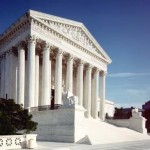Today at SCOTUS – 11/4/2013
Today, the Supreme Court hears arguments about (1) the Fair Labor Standards Act and (2) the outer limits of personal jurisdiction and venue:
(1) Sandifer v. United State Steel Corp. [see our preview at http://www.law.cornell.edu/supct/cert/12-417]
- Should workers be compensated for time spent putting on and taking off safety gear, when the applicable collective bargaining agreement excludes time spent “changing clothes” from the compensable workday and that exclusion is permitted by section 203(o) of the Fair Labor Standards Act?
(2) Walden v. Fiore [see our preview at http://www.law.cornell.edu/supct/cert/12-574]
- Can a court exercise personal jurisdiction over a defendant whose only contact with the forum state is his knowledge that the plaintiffs had contacts with the state?
- Is the district where a plaintiff suffered injury a proper venue if all of the alleged events giving rise to the claim were committed by the defendant in a different district?





